Company Law Case Study: External Administration and Fundraising
VerifiedAdded on 2020/04/21
|5
|1144
|146
Case Study
AI Summary
This case study analyzes two problem questions related to Company Law. The first problem explores the concept of External Administration, discussing scenarios where companies face financial difficulties, leading to insolvency or liquidation. It examines the roles of external administrators, the types of administration (voluntary and involuntary), and relevant sections of the Corporation Act 2001, such as section 435A and 461(1)(k). The second problem focuses on Fundraising, specifically addressing the issuance of shares, false information provided to investors, and the legal implications under Chapter 6D of the Corporation Act and the Bankruptcy Act 1966 (Cth). The case highlights issues like misrepresentation, breach of contract, and potential complaints to the Australian Securities and Investments Commission (ASIC). The study provides a comprehensive overview of the legal and practical aspects of corporate financial distress and fundraising activities.
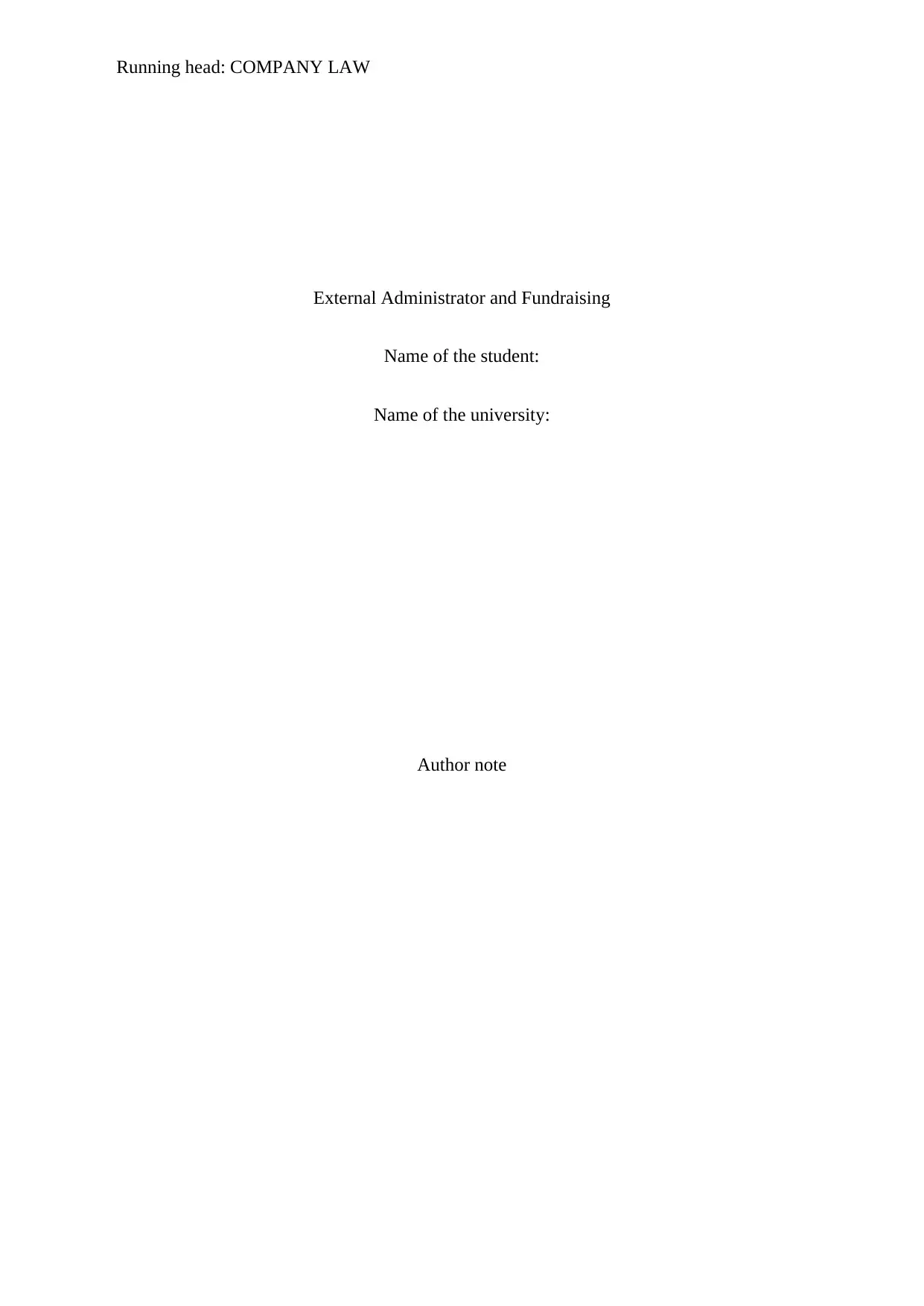
Running head: COMPANY LAW
External Administrator and Fundraising
Name of the student:
Name of the university:
Author note
External Administrator and Fundraising
Name of the student:
Name of the university:
Author note
Paraphrase This Document
Need a fresh take? Get an instant paraphrase of this document with our AI Paraphraser
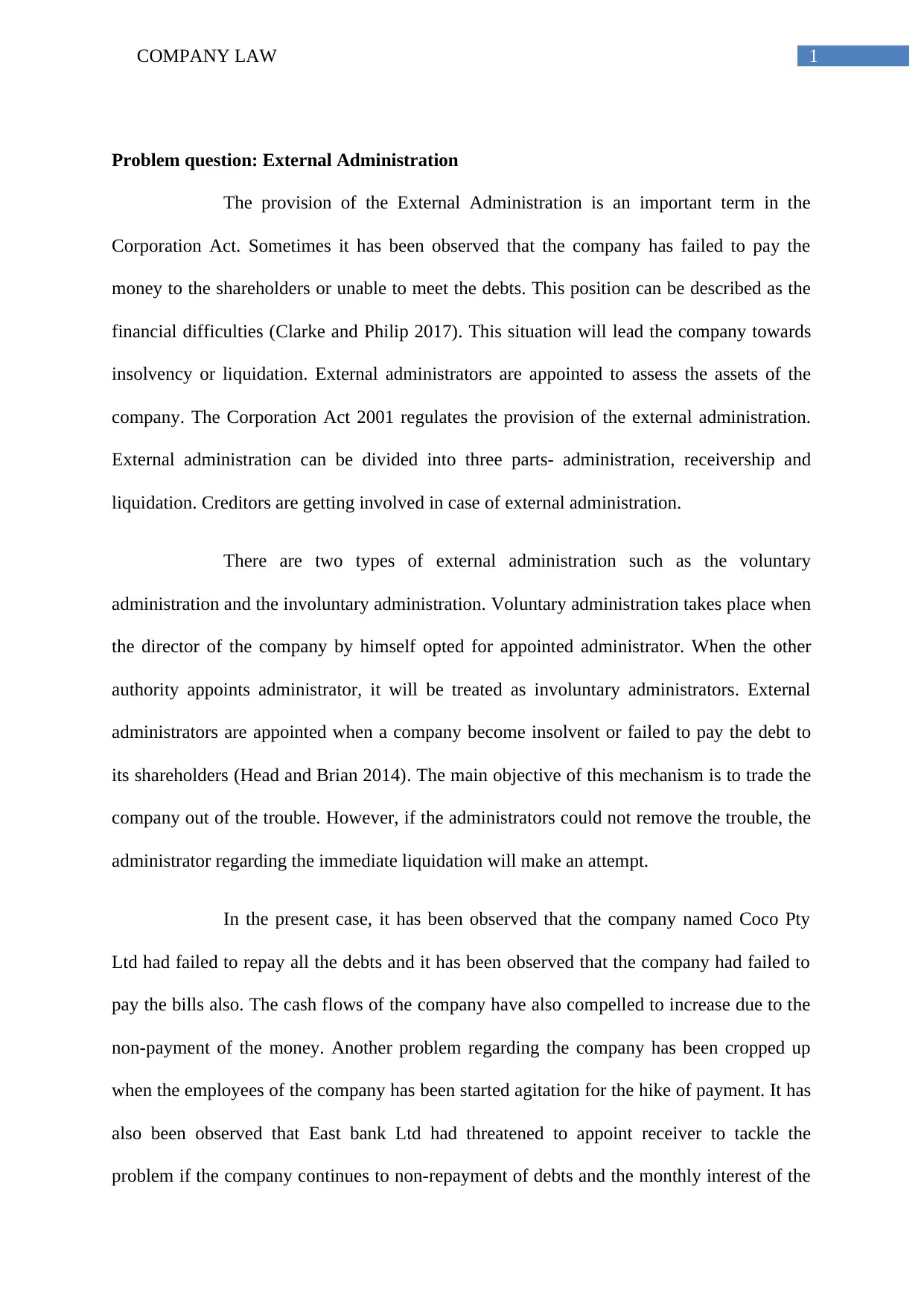
1COMPANY LAW
Problem question: External Administration
The provision of the External Administration is an important term in the
Corporation Act. Sometimes it has been observed that the company has failed to pay the
money to the shareholders or unable to meet the debts. This position can be described as the
financial difficulties (Clarke and Philip 2017). This situation will lead the company towards
insolvency or liquidation. External administrators are appointed to assess the assets of the
company. The Corporation Act 2001 regulates the provision of the external administration.
External administration can be divided into three parts- administration, receivership and
liquidation. Creditors are getting involved in case of external administration.
There are two types of external administration such as the voluntary
administration and the involuntary administration. Voluntary administration takes place when
the director of the company by himself opted for appointed administrator. When the other
authority appoints administrator, it will be treated as involuntary administrators. External
administrators are appointed when a company become insolvent or failed to pay the debt to
its shareholders (Head and Brian 2014). The main objective of this mechanism is to trade the
company out of the trouble. However, if the administrators could not remove the trouble, the
administrator regarding the immediate liquidation will make an attempt.
In the present case, it has been observed that the company named Coco Pty
Ltd had failed to repay all the debts and it has been observed that the company had failed to
pay the bills also. The cash flows of the company have also compelled to increase due to the
non-payment of the money. Another problem regarding the company has been cropped up
when the employees of the company has been started agitation for the hike of payment. It has
also been observed that East bank Ltd had threatened to appoint receiver to tackle the
problem if the company continues to non-repayment of debts and the monthly interest of the
Problem question: External Administration
The provision of the External Administration is an important term in the
Corporation Act. Sometimes it has been observed that the company has failed to pay the
money to the shareholders or unable to meet the debts. This position can be described as the
financial difficulties (Clarke and Philip 2017). This situation will lead the company towards
insolvency or liquidation. External administrators are appointed to assess the assets of the
company. The Corporation Act 2001 regulates the provision of the external administration.
External administration can be divided into three parts- administration, receivership and
liquidation. Creditors are getting involved in case of external administration.
There are two types of external administration such as the voluntary
administration and the involuntary administration. Voluntary administration takes place when
the director of the company by himself opted for appointed administrator. When the other
authority appoints administrator, it will be treated as involuntary administrators. External
administrators are appointed when a company become insolvent or failed to pay the debt to
its shareholders (Head and Brian 2014). The main objective of this mechanism is to trade the
company out of the trouble. However, if the administrators could not remove the trouble, the
administrator regarding the immediate liquidation will make an attempt.
In the present case, it has been observed that the company named Coco Pty
Ltd had failed to repay all the debts and it has been observed that the company had failed to
pay the bills also. The cash flows of the company have also compelled to increase due to the
non-payment of the money. Another problem regarding the company has been cropped up
when the employees of the company has been started agitation for the hike of payment. It has
also been observed that East bank Ltd had threatened to appoint receiver to tackle the
problem if the company continues to non-repayment of debts and the monthly interest of the
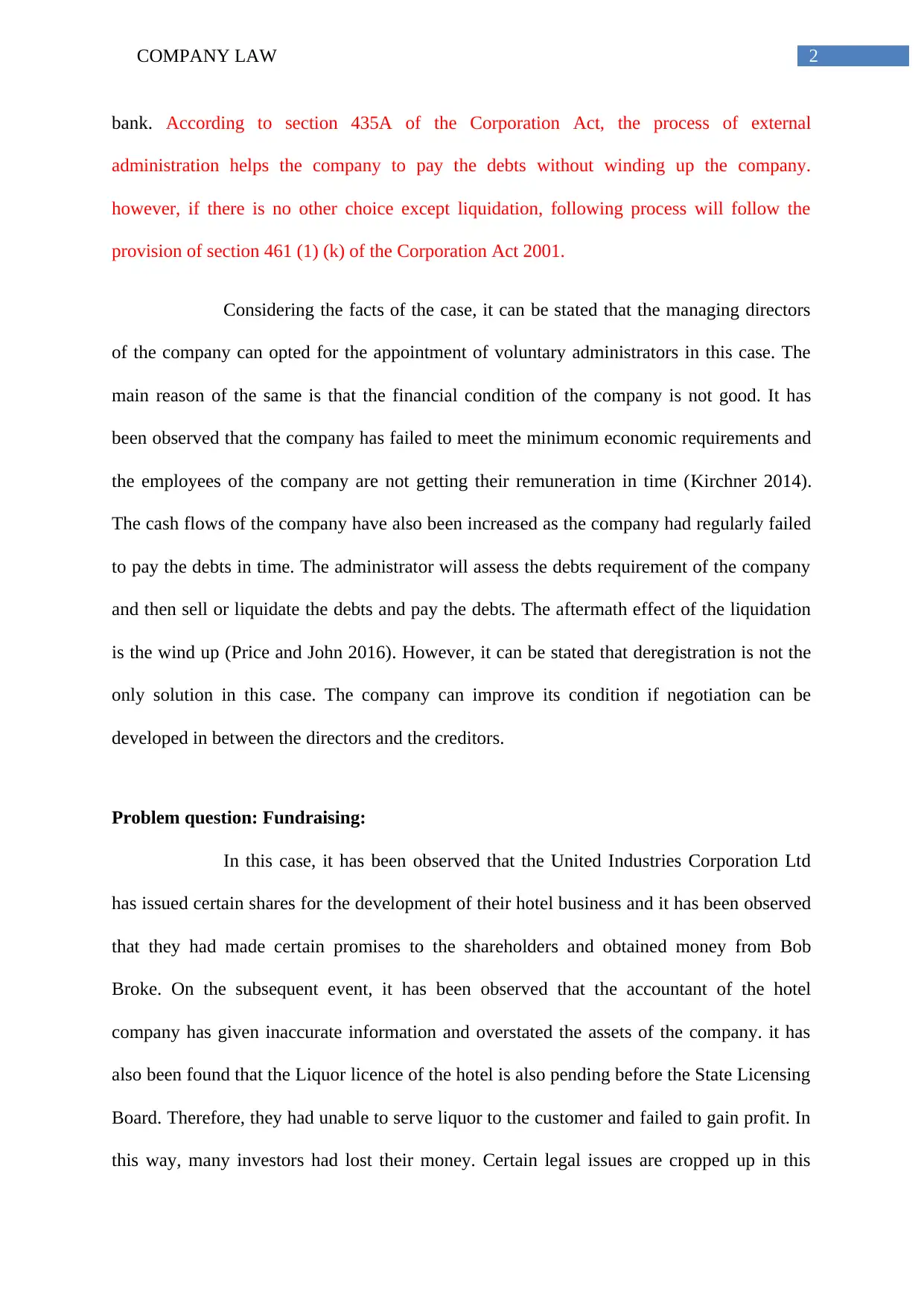
2COMPANY LAW
bank. According to section 435A of the Corporation Act, the process of external
administration helps the company to pay the debts without winding up the company.
however, if there is no other choice except liquidation, following process will follow the
provision of section 461 (1) (k) of the Corporation Act 2001.
Considering the facts of the case, it can be stated that the managing directors
of the company can opted for the appointment of voluntary administrators in this case. The
main reason of the same is that the financial condition of the company is not good. It has
been observed that the company has failed to meet the minimum economic requirements and
the employees of the company are not getting their remuneration in time (Kirchner 2014).
The cash flows of the company have also been increased as the company had regularly failed
to pay the debts in time. The administrator will assess the debts requirement of the company
and then sell or liquidate the debts and pay the debts. The aftermath effect of the liquidation
is the wind up (Price and John 2016). However, it can be stated that deregistration is not the
only solution in this case. The company can improve its condition if negotiation can be
developed in between the directors and the creditors.
Problem question: Fundraising:
In this case, it has been observed that the United Industries Corporation Ltd
has issued certain shares for the development of their hotel business and it has been observed
that they had made certain promises to the shareholders and obtained money from Bob
Broke. On the subsequent event, it has been observed that the accountant of the hotel
company has given inaccurate information and overstated the assets of the company. it has
also been found that the Liquor licence of the hotel is also pending before the State Licensing
Board. Therefore, they had unable to serve liquor to the customer and failed to gain profit. In
this way, many investors had lost their money. Certain legal issues are cropped up in this
bank. According to section 435A of the Corporation Act, the process of external
administration helps the company to pay the debts without winding up the company.
however, if there is no other choice except liquidation, following process will follow the
provision of section 461 (1) (k) of the Corporation Act 2001.
Considering the facts of the case, it can be stated that the managing directors
of the company can opted for the appointment of voluntary administrators in this case. The
main reason of the same is that the financial condition of the company is not good. It has
been observed that the company has failed to meet the minimum economic requirements and
the employees of the company are not getting their remuneration in time (Kirchner 2014).
The cash flows of the company have also been increased as the company had regularly failed
to pay the debts in time. The administrator will assess the debts requirement of the company
and then sell or liquidate the debts and pay the debts. The aftermath effect of the liquidation
is the wind up (Price and John 2016). However, it can be stated that deregistration is not the
only solution in this case. The company can improve its condition if negotiation can be
developed in between the directors and the creditors.
Problem question: Fundraising:
In this case, it has been observed that the United Industries Corporation Ltd
has issued certain shares for the development of their hotel business and it has been observed
that they had made certain promises to the shareholders and obtained money from Bob
Broke. On the subsequent event, it has been observed that the accountant of the hotel
company has given inaccurate information and overstated the assets of the company. it has
also been found that the Liquor licence of the hotel is also pending before the State Licensing
Board. Therefore, they had unable to serve liquor to the customer and failed to gain profit. In
this way, many investors had lost their money. Certain legal issues are cropped up in this
⊘ This is a preview!⊘
Do you want full access?
Subscribe today to unlock all pages.

Trusted by 1+ million students worldwide
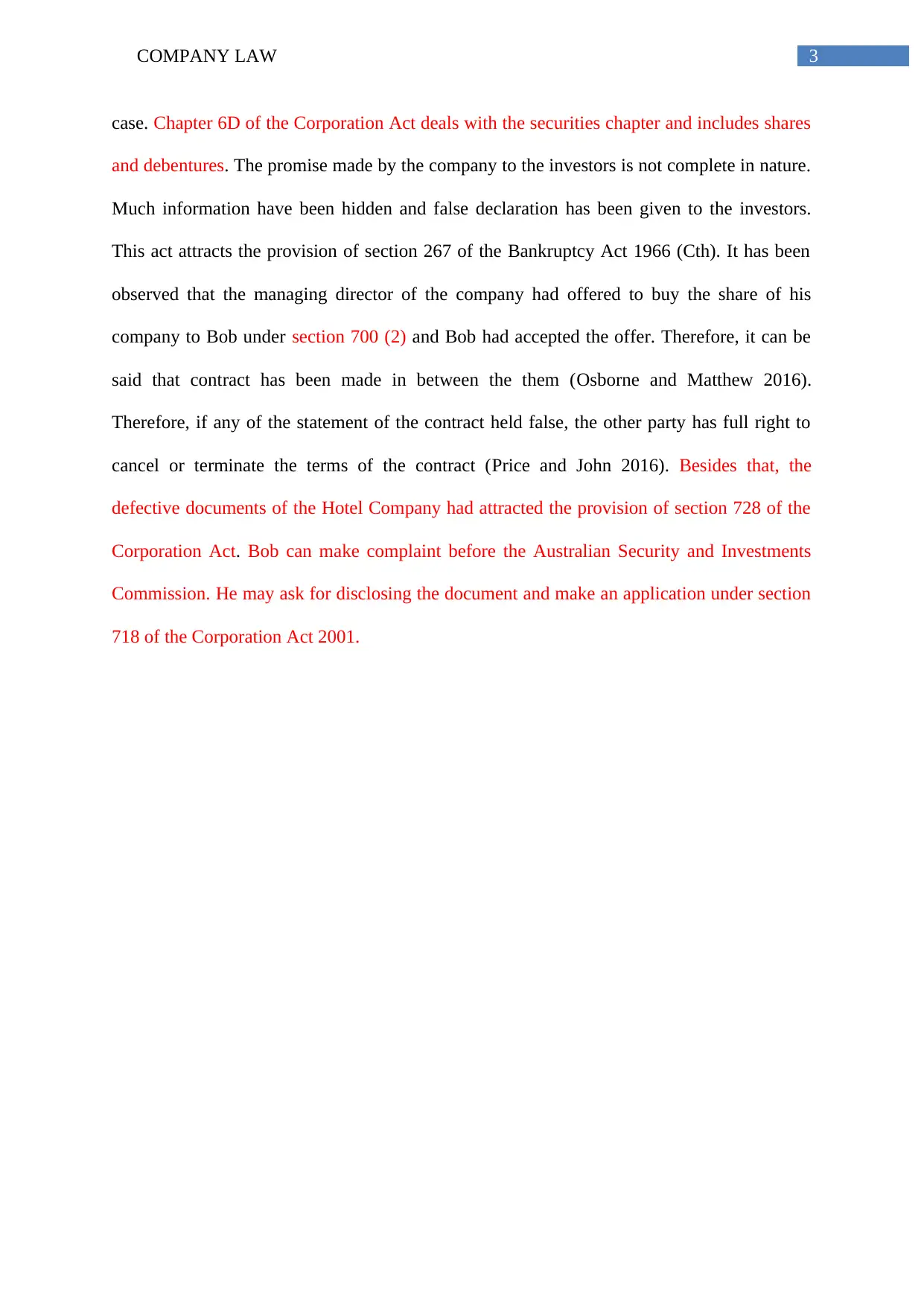
3COMPANY LAW
case. Chapter 6D of the Corporation Act deals with the securities chapter and includes shares
and debentures. The promise made by the company to the investors is not complete in nature.
Much information have been hidden and false declaration has been given to the investors.
This act attracts the provision of section 267 of the Bankruptcy Act 1966 (Cth). It has been
observed that the managing director of the company had offered to buy the share of his
company to Bob under section 700 (2) and Bob had accepted the offer. Therefore, it can be
said that contract has been made in between the them (Osborne and Matthew 2016).
Therefore, if any of the statement of the contract held false, the other party has full right to
cancel or terminate the terms of the contract (Price and John 2016). Besides that, the
defective documents of the Hotel Company had attracted the provision of section 728 of the
Corporation Act. Bob can make complaint before the Australian Security and Investments
Commission. He may ask for disclosing the document and make an application under section
718 of the Corporation Act 2001.
case. Chapter 6D of the Corporation Act deals with the securities chapter and includes shares
and debentures. The promise made by the company to the investors is not complete in nature.
Much information have been hidden and false declaration has been given to the investors.
This act attracts the provision of section 267 of the Bankruptcy Act 1966 (Cth). It has been
observed that the managing director of the company had offered to buy the share of his
company to Bob under section 700 (2) and Bob had accepted the offer. Therefore, it can be
said that contract has been made in between the them (Osborne and Matthew 2016).
Therefore, if any of the statement of the contract held false, the other party has full right to
cancel or terminate the terms of the contract (Price and John 2016). Besides that, the
defective documents of the Hotel Company had attracted the provision of section 728 of the
Corporation Act. Bob can make complaint before the Australian Security and Investments
Commission. He may ask for disclosing the document and make an application under section
718 of the Corporation Act 2001.
Paraphrase This Document
Need a fresh take? Get an instant paraphrase of this document with our AI Paraphraser
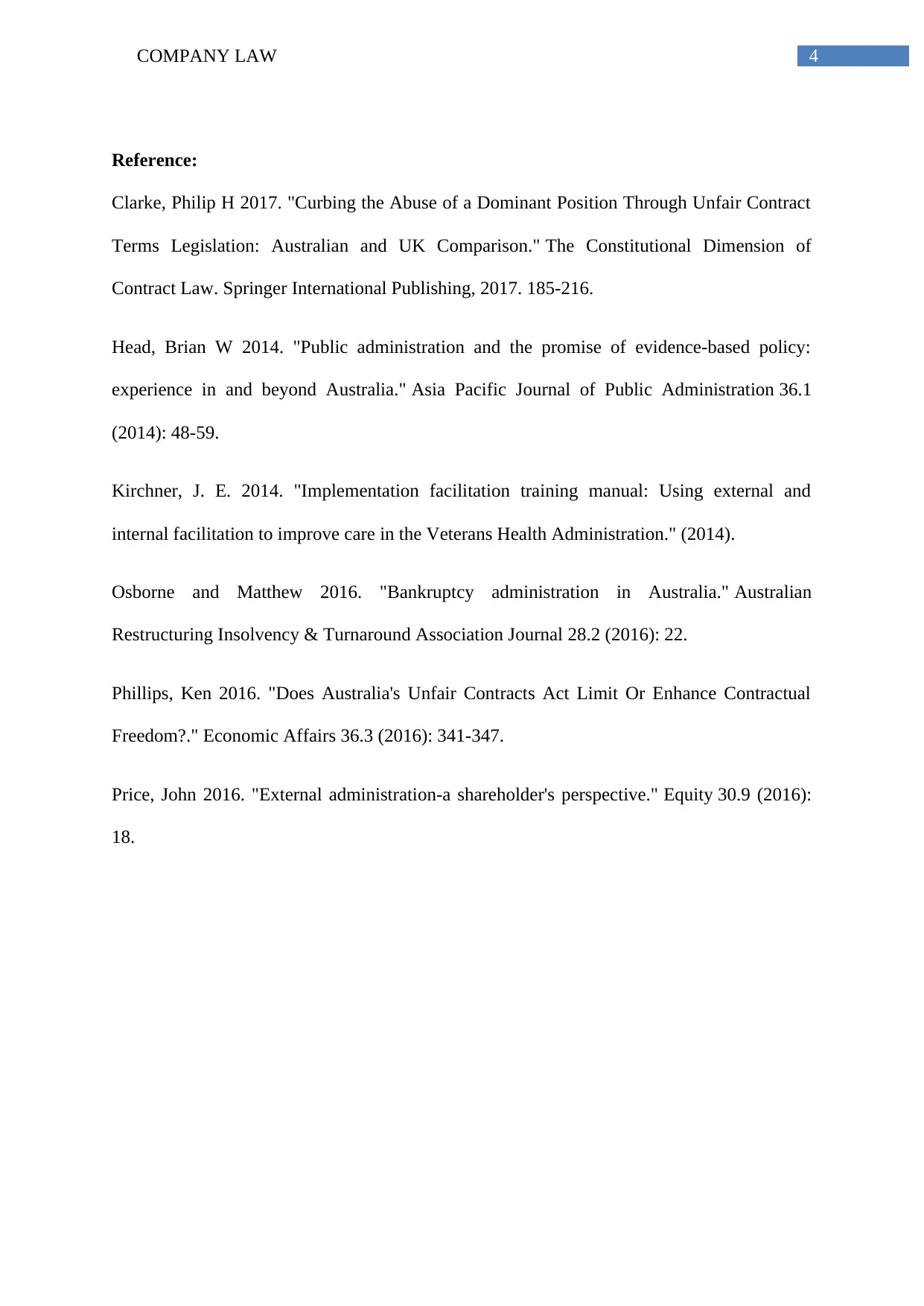
4COMPANY LAW
Reference:
Clarke, Philip H 2017. "Curbing the Abuse of a Dominant Position Through Unfair Contract
Terms Legislation: Australian and UK Comparison." The Constitutional Dimension of
Contract Law. Springer International Publishing, 2017. 185-216.
Head, Brian W 2014. "Public administration and the promise of evidence-based policy:
experience in and beyond Australia." Asia Pacific Journal of Public Administration 36.1
(2014): 48-59.
Kirchner, J. E. 2014. "Implementation facilitation training manual: Using external and
internal facilitation to improve care in the Veterans Health Administration." (2014).
Osborne and Matthew 2016. "Bankruptcy administration in Australia." Australian
Restructuring Insolvency & Turnaround Association Journal 28.2 (2016): 22.
Phillips, Ken 2016. "Does Australia's Unfair Contracts Act Limit Or Enhance Contractual
Freedom?." Economic Affairs 36.3 (2016): 341-347.
Price, John 2016. "External administration-a shareholder's perspective." Equity 30.9 (2016):
18.
Reference:
Clarke, Philip H 2017. "Curbing the Abuse of a Dominant Position Through Unfair Contract
Terms Legislation: Australian and UK Comparison." The Constitutional Dimension of
Contract Law. Springer International Publishing, 2017. 185-216.
Head, Brian W 2014. "Public administration and the promise of evidence-based policy:
experience in and beyond Australia." Asia Pacific Journal of Public Administration 36.1
(2014): 48-59.
Kirchner, J. E. 2014. "Implementation facilitation training manual: Using external and
internal facilitation to improve care in the Veterans Health Administration." (2014).
Osborne and Matthew 2016. "Bankruptcy administration in Australia." Australian
Restructuring Insolvency & Turnaround Association Journal 28.2 (2016): 22.
Phillips, Ken 2016. "Does Australia's Unfair Contracts Act Limit Or Enhance Contractual
Freedom?." Economic Affairs 36.3 (2016): 341-347.
Price, John 2016. "External administration-a shareholder's perspective." Equity 30.9 (2016):
18.
1 out of 5
Related Documents
Your All-in-One AI-Powered Toolkit for Academic Success.
+13062052269
info@desklib.com
Available 24*7 on WhatsApp / Email
![[object Object]](/_next/static/media/star-bottom.7253800d.svg)
Unlock your academic potential
Copyright © 2020–2025 A2Z Services. All Rights Reserved. Developed and managed by ZUCOL.




